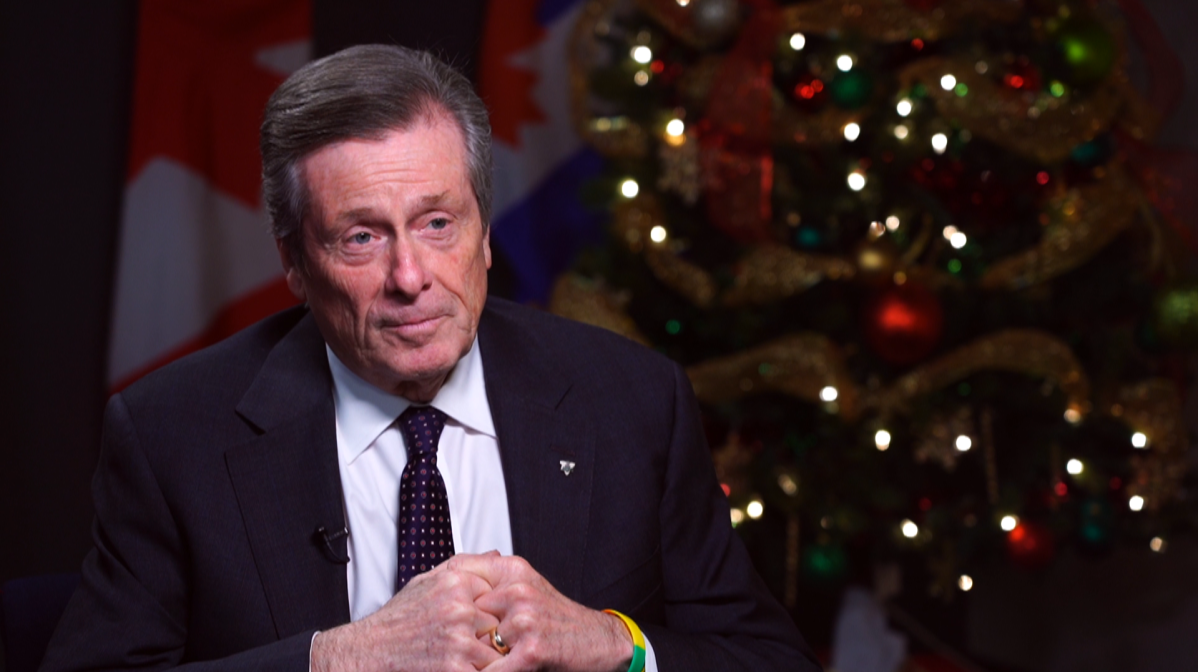In a year-end interview, Toronto’s mayor said there is hope the city will turn a corner following years of pandemic management, while also warning the city will also many challenges as its struggles with ongoing financial strains and mounting public safety issues, which he said Toronto cannot tackle alone.

The tail-end of 2022 marks the beginning of the end of John Tory’s tenure as Toronto’s Mayor. After handily winning a third term in a fall election, Tory made it clear the next four years will be his last in the role. Ahead of the last City Council meeting of the year, Tory stated during a feisty press conference, he is in a race against time to deliver the expanded housing the city desperately needs.
The council meeting that followed his turn with reporters, was even more challenging for Tory, as councillors in opposition to his new expanded mayoral powers granted by the province, routinely battled with him. The Ford Government’s decision to grant the mayors of Ottawa and Toronto with unprecedented powers under Bill 39, has been incredibly unpopular with the majority of Toronto’s leaders. With them, Tory is able to pass motions he deems “of provincial priority” with only a third of their support.
Seeking to ease the tension, Tory has repeatedly said he will only use the powers if consensus cannot be formed with councillors on housing and transit items, and if he has the backing of a city staff report. That assurance hasn’t helped and council meetings have repeatedly devolved into shouting matches.
Still, when asked if the controversy surrounding Bill 39 was worth it with the infighting it has resulted in, Tory insists he hasn’t bitten off more than he can chew by seeking the expanded powers from the province.

Get daily National news
“I’m not a different person,” Tory said. “So in the end, I believe the same way we worked through things before will prevail.” But he added anyone who wants to maintain tension on Council over his new powers, will have to make that decision on their own.
“I’m not going there. I’m getting on with building housing because that’s what the people elected me to do. They did not elect me to come down here and have endless debates about what the powers of the mayor are, regardless of what they are,” he said.
With the new year will come another challenging budget process — one made even more difficult because of a major budget hole that remained late into the current fiscal year. Municipalities are legally bound to balance their budgets and Tory had been leaning on upper levels of government to plug the remaining gap caused largely by pandemic-related costs. The Government of Ontario said it would cover a third of the remaining $702-million chasm.
By the final council meeting, the Federal Government still hadn’t made any commitments, prompting a council decision championed by the mayor to name and shame any tax increases on future tax bills on Ottawa. “We also said that we would call out, in a positive way, those that did help,” said Tory, but he said he isn’t certain just where the effort will end up.
“We’ve also made prudent financial decisions to make sure that in no case will the city’s sound financial management be jeopardized by other levels of government. I’d like to hope they can help and will help,” he said.
The city’s finances aren’t the only area Tory said other levels of government need to step up their support. There were many acts of violence in 2022, some of them random in nature. Tory has said he intends to increase pressure to ensure that both Queen’s Park and Ottawa are pulling their weight on mental health supports.
“What we do to help people suffering from mental illness in this province, and I would say in this country, is broken. It’s badly broken,” Tory said. Before the city can address the public safety risk posed by people going through mental health crises on the street or on the TTC, he said it’s time systemic issues with health care were solved. In the shorter term, Tory said an increased presence of mental health and shelter support workers on the transit system could help.
On public safety, Tory said he will be supporting a request by Toronto Police Service’s new Chief, Myron Demkiw, to increase the policing budget. He said his experiences speaking to communities directly impacted by gun violence in the aftermath of a shooting have influenced his thought process on police resources. “They want more officers, especially ones that are walking through the neighbourhood on foot on the beat, getting to know everyone,” he said.
Tory said the average increase of the police budget, which he argues is matching the needs of a growing city, has been a responsible number. “If you think right now when community safety is threatened, one of the safest cities in the world has some problems right now, that I’m going to cut the police budget and take police officers off the street, I’m not going to do that.” But Tory added that he will be conscious of whatever increase is granted, that it will be responsible and whatever advocacy he provides will be for “better policing.”
As he prepares to enter a new year on the job, Tory said he has great hope for the future as the city continues to face some very real challenges. Adding that he hopes people will take the time to check in on their fellow Torontonians, who may be struggling under the burdens of sky-high inflation, ongoing pandemic strains, or mental health struggles.
January will be a busy month for Mayor Tory and his colleagues, with the 2023 Budget Committee launch scheduled for Jan. 10 and the executive committee meeting on Jan. 31. City council won’t meet until the following months, when it will have two scheduled sessions to go over city matters and one dedicated solely to the budget.











Comments